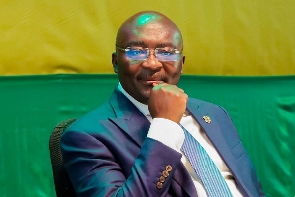Government is targetting to save about US$3billion in foreign exchange yearly from the proposed gold for oil barter policy, Vice President Dr. Mahamudu Bawumia has revealed.
The policy seeks to accumulate domestically mined gold in exchange for finished petroleum products, which he explains will reduce demand for foreign exchange to finance imports of petroleum products worth about US$3billion yearly.
“So, we will be saving US$3billion from lack of demand from the Bank of Ghana for foreign exchange. This reduces pressure on the cedi immediately, and therefore you will see much, much lower depreciation of the currency,” he explained.
Government plans to implement the gold for oil exchange in the first quarter of next year.
Instead of the Bulk Distribution Companies going to the Bank of Ghana every few weeks to ask for foreign exchange to import oil, he said, this will no longer be the case when the barter policy is implemented.
This, he added, will effectively lower depreciation of the currency by ushering in a more stable exchange rate regime to enable the business community to flourish.
Speaking at the 11th Association of Ghana Industries (AGI) Awards 2022 in Accra, he said the import-reliant nature of the economy – particularly for finished petroleum products – accelerates depreciation of the cedi, increases cost of doing business and the cost of living.
“What drives fuel price increases, what drives the cost of doing business is fundamentally the exchange rate. So, if you are able to have a handle on the exchange rate movement, you are able to lower depreciation of the cedi,” he said.
Since independence, he added, the country has accumulated just 8 tonnes of gold despite being one of the world’s leading producers of the precious yellow metal.
Against this backdrop, the Vice President said the policy will require large gold mining companies to sell at least 20 percent of their gold to the central bank in domestic currency.
All other miners, including community mining schemes and small-scale miners, will also be mandated to sell their gold to the Precious Minerals Company beginning in first-quarter 2023.
Domestic purchase of the precious metal is to enable government accumulate substantial gold reserves for the barter policy.
No anti-dollar agenda
Dr. Bawumia said the barter policy is to correct a problem in the economy, contrary to claims that government is against the use of United States dollars in international transactions.
“We are not on any mission against use of the United States dollar in international transactions. In fact, we want to accumulate more dollars in our reserves.
“We have a specific issue to deal with – oil import and the nexus between those oil imports and the price of fuel, transport, food and utilities – and that is essentially what we are targetting by exchanging our gold for oil,” he clarified.
Most importantly, the move is to insulate domestic industries from persistent depreciation of the cedi – which also affects the cost of doing business and cost of living.
The domestic currency has depreciated by over 53 percent this year, one of its worst performances in history.
With a more stable exchange rate and microeconomic environment, he said: “There are many products that we are importing which we have the capacity to produce in Ghana”.
Meanwhile, president of AGI Humphrey Ayim-Darke said exchange rate volatility remains a major headache for businesses.
“Exchange rate losses continue to rise, and we can only hope that the measures being put in place will give us a glimmer of hope and some recovery within next year.
“While we acknowledge that a number of the current challenges emanate from external shocks over which we have little control, we urge government to expedite the announced measures so we can all smile again,” he advocated.
AGI Ghana Industry and Quality Awards
Organised by the Association of Ghana Industries in partnership with the Ministry of Trade and Industry and Ghana Standards Authority, the annual awards ceremony is designed to recognise excellence and innovation in the country’s manufacturing sector.
This year’s event, themed ‘Leveraging public-private collaborations to facilitate business recovery’, saw Kasapreko Company Limited walk away with the coveted Industrial Company of the Year award.
Business News of Thursday, 1 December 2022
Source: thebftonline.com
Government targets US$3 billion forex savings from gold-oil barter policy
Opinions












